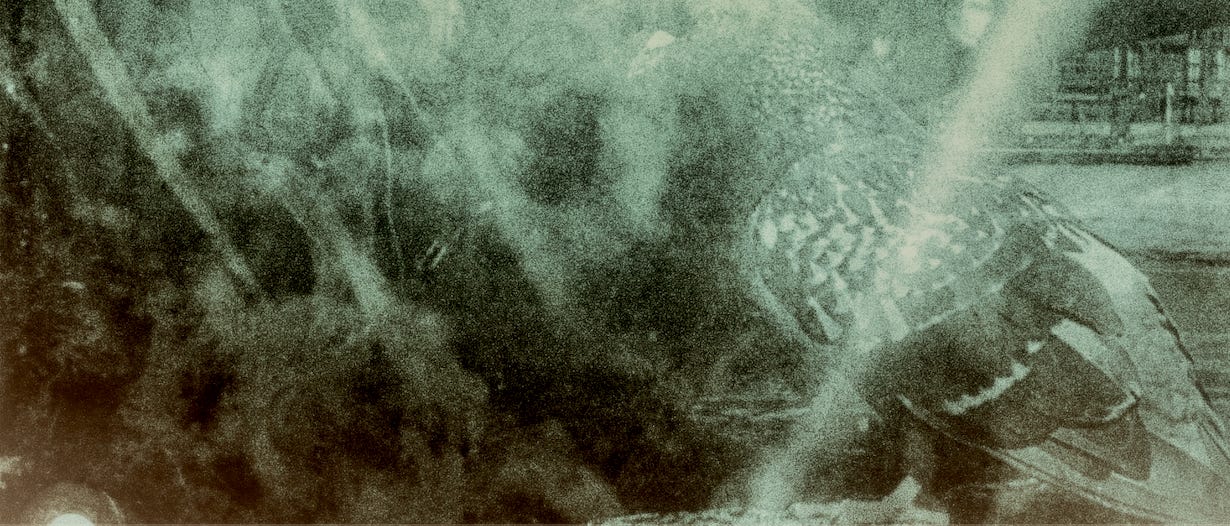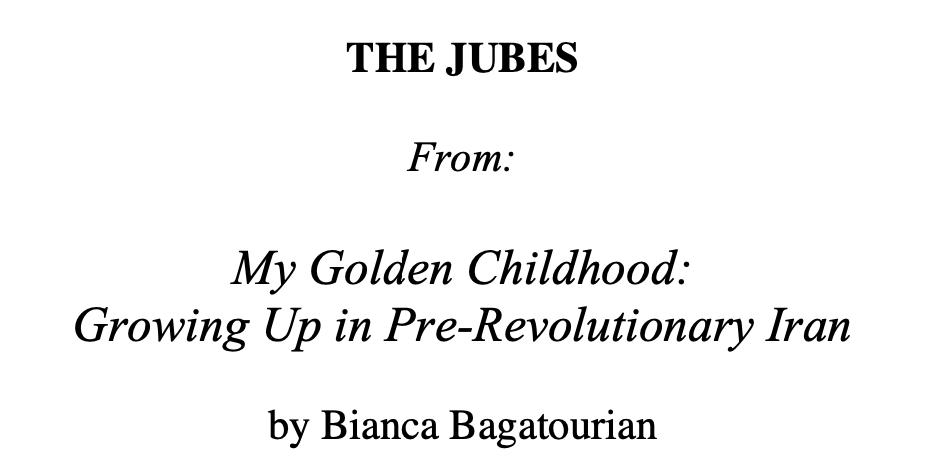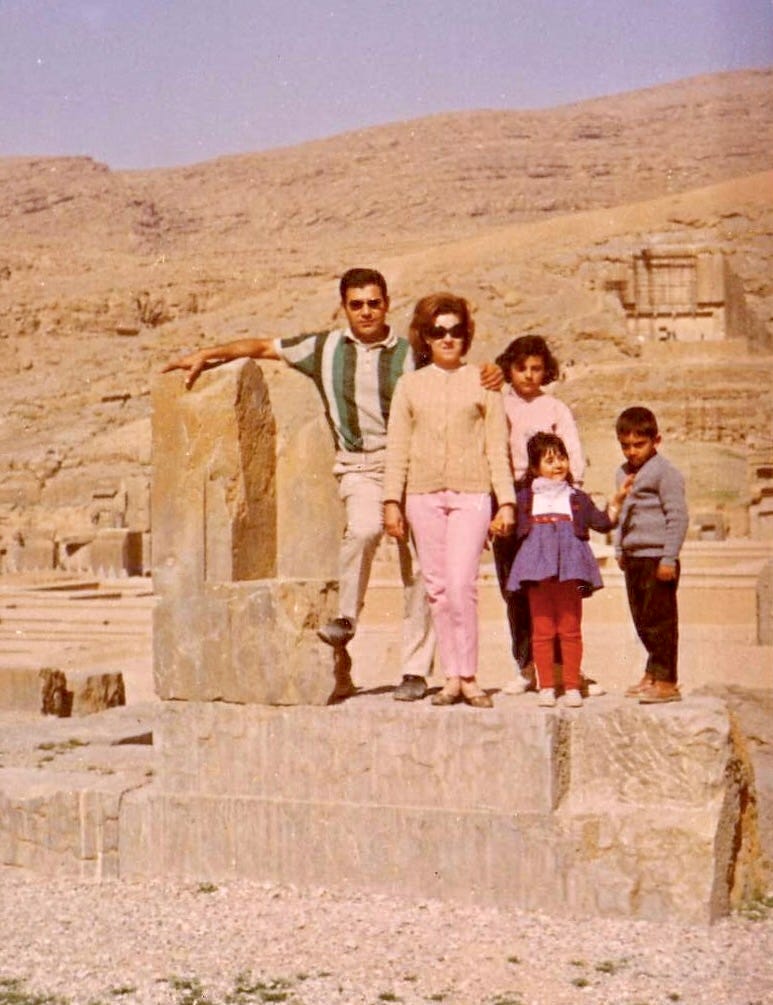Iran is going through much civil unrest as it struggles toward democracy. Everyone has the right to freedom and it is inspiring to see the younger generation lose their fear of the theocracy and take on the protests but sorrowful to see so many lose their lives. Please send strength and prayers to this courageous group who shout, "Shoot us! We are not afraid anymore.” #MahsaAmini
Iran is the country I was born in though I am of Armenian heritage. I had a wonderful childhood growing up there in the sixties before I moved to the UK and then the US. In this section, I’ll be sharing stories depicting my time there which I wrote as a necessity to ground myself. The stories are personal to me so I ask that you don’t share them.
INTRO
Don’t think I‘m writing this for you, the audience. No. A memoir is a selfish act. I am writing this for me and if you happen to read it, then it is for you, too. Rootlessness permeates my every day. The stories and memories that flood my dreams are now being put on paper, as much as I can remember before they slowly disintegrate. As my ancestors pass away, I try to navigate the past and preserve the pieces of their lives that glittered. What follows is my personal history growing up in one of the grandest civilizations where political significance is overwhelmed by the personal. In bridging the gaping void between the East and the West, the stories mirror the discord between the two - a part of a larger metatext being written in the world today about political turmoil and the resulting personal conflict inflicted upon innocent citizens, especially children.
My first piece THE JUBES below, has a cool backstory. But before I begin, let me say that my thoughts and prayers are with the writer, Salman Rushdie, who was brutally attacked for his writing a few months ago. A terrifying reminder of censorship in writing, something we must fervently fight. The generosity of Rushdie’s spirit can be seen below when he offered me a critique of my writing, one of the absolute highlights of my career!
It was 1990 when I decided to leave my ludicrous career in advertising and become a writer. That was also around the same time that a Fatwa had been pronounced on the life of Salman Rushdie for “insulting Islam” in his book, THE SATANIC VERSES (which has the most gorgeous opening 14 pages). The work of Salman Rushdie, one of the greatest writers of our time was a big reason why I was writing. But, my resolve to send him my very first story faced a big obstacle as he was in hiding. So…“Dear Penguin Publishers, please forward my story to Mr. Rushdie. “ Lo and behold my surprise soon after when an envelope with no return address arrived announcing I could actually write!
Gazing down at the mark on her hand, she trembled. Where was this from? Another world, another time. Is it right it should infringe, be here today? She looked down at the freeways crisscrossing below like veins in a body. 101 North. 134 East. 210 West. America. So far removed.
A long time ago, in a land a long way away, there was this child, a child who liked to play on the street, by the gutter. One night, while bouncing a bottle cap on a tennis racket, she had taken a fall. She stumbled and hit the ground. The jagged gutter cut her hand open and tears and tears and blood and tears ran everywhere as her father held her tight until all was forgotten. All but a scar. This scar that stayed when all else was gone.
She shook her hand hard, but like a brand on an animal, it stayed. It had become her. A her she could no longer awaken. She remembered staring at the sky that night, so full of stars. She had been there, she was sure. But what else had been?
Streets! Bustling at all times with bodies out looking for life. Barbecued corn-on-the-cob, dipped in salt water, at every street corner. Wooden carts rollicking along selling steamed beets as big as a cabbage that made your hands blood red. Huge glass jars propped against curbs with walnuts soaking in salt water, their skins dropping off in front of battery-powered lights. Mothers, followed by small children, stopping at the butcher’s on this block, the shoe-makers on the next or visiting the store-keepers wives on every block to deliver news that was old before it arrived. Old men, gathered at certain corners, counting worry beads and telling anecdotes of the old, boasting of the young and complaining of their wives and busy with just worry worry worry that eventually spilled over the side and into the gutter. And yes, there had always been the gutter. Running everywhere. Left and right, on the side, by your side, following, leading, parallel. We had a different name for them. Gutters jutting, jarring, jagged, juggling, jostling along their journey. We called them jubes. Just jubes. A name of a low kind, from a low place. A place insults sometimes are born. A place below the ground. A place not often seen.
The jubes felt all and heard all in the city. They heard curses throughout the city as Michelin tires sank in poor parking attempts. They held deep dark secrets muttered by their sides. They silenced the splash of raindrops. They heard the wind whistle through their cracks. And, they heard the cars. There were always lots of cars. Big cars, little cars, always foreign cars and then one day came the ‘Paykans,’ self-manufactured cheap cars metamorphosed into orange taxis with fresh flowers camouflaging the sweaty air with delicious scents as they rushed bodies along the roads that ran alongside the jubes.
More curses were overheard as slender young ankles twisted their way out of a too-narrow jube. The humming of engines did not go unnoticed as it mingled with the purring of cats. Yes, cats. Hundreds of cats. Numerous cats lazing in the sun liked and fed by all. Cats who found their lifeline drinking out of a cool jube on a hot sun-drenched day. And yes, there was always the scorching sun.
The summer months came and the jubes went. They dried up as sweat poured out and heat rose from the asphalt and distorted all views and fans blew winds that were otherwise still. The sun did a desert dance where appeared a mirage of jubes starring raging waters in an underneath show.
You languished indoors in front of an RCA fan with its colored paper strands blowing every which way and the sweat pouring downwards until you finally made peace with the heat. Ice cubes melting off your forehead. Rivers dried up as everyone searched for cool blue water. Big blue swimming hole in front of a villa. Always swimming pools for such searing summer days. Those dreamy turquoise holes that became your second home, your escape to oblivion. Water cold as ice from the mountains above felt fine beneath the equatorial heat. Little brown girls submerged until they emerged with pruned skin. Ice-cold water in the shadow of a jube.
The jubes kept seeing all and hearing all. If you glanced to the left you’d see chalk-drawn hop-scotch grids covering short blocks at the mercy of a stone's throw. To the right, jump rope whipping the pavement to the pitter-patter of bare little feet. And above, there was music. That sweet sitar streaming in and out as you walked past alleys, along the gutters, lifting you up just a little bit higher. And there was prayer, early at dawn. Mats spread Mecca-wards, as people bowed ritually up, then down. Just as there were mosques, not on every street corner but occasionally colossal breathtaking mosques of inlaid tiles, kaleidoscope-like blue, infinitely spinning stories that went off in every direction and led back to the foundations of rock, next to the flow of a gutter-jube. Such stories. Stories the old would tell the young and the young would tell the younger.
Yes, the jubes ran everywhere! They ran wild into places not otherwise planned. They tied all pieces together, north to south, rich to poor, village to city, like arteries in a body. And if you followed the flow all the way down south, south of the city where the less-fortunate-than-us lived, you'd run past a house, not just any house, a slaughterhouse where they killed only sheep, that's right sheep, not pigs. And so we once heard from this well-to-do man, who traveled to Moscow to import state-of-the-art freezers to this slaughterhouse, that here in front of the door, where the jube made its way, the poor people would squat with their pots and pans, no, not to wash their hands or clothes or feet, no, here they would sit to capture pieces of fat drenched in blood that would escape at the moment of the slaughter. Yes, here they would sit gathering pot after pot of sheep's blood to take home for their dinner. And, then this important man went on to tell us how dirty these people were, that they were animals, that they should be shot one by one, because what was the use of them littering the streets, just filth drenched in blood.
Drenched in blood had been her hand under a starry sky one summer's night next to the side of a jube. And as that gutterjube cut into her, it entered her. It flowed through the veins of her body and never left, moving back and forth and forth and back and back again until finally, it surfaced, marking its own. And now, it made its involuntary way across the seas, water over water, sea over sea, flowing through her, to a new destination. An old path, an old groove. A scar. A pattern that danced upon the hand. A remnant, a ruin, a relic of a forgotten world. A lost Persepolis.
All was gone now.
She looked outside at the freeway below, tying her new world together. She no longer saw the jubes. But as she looked down at her hand, she claimed them back. This relic, this ruin was one that could not be taken away. In its shape, you could discern a valley, a hill, a sharp curve, perhaps a direction, maybe even a reason. And though she might never walk along the periphery of a jube again in this life, she knew it was okay. It was okay because no matter what was lost and no matter what was taken, the jubes were still flowing. They flowed deep inside her and most importantly, they were steadily running from east to west and then from west to east and then back again, delivering her safely back to her home, back to where she belonged, back to the east.










This was a poetic description of the jubes that they were running up and down, east and west in Tehran where I grew up. Your detailed narrative brought to life a slice of a forgotten past. I also liked the pictures you posted.
Love this, Bianca. Your descriptions are so evocative; I felt like I was there beside your kid self in that golden sunlight, azaan singing out in the dusty air and reverberating there. 🕌💫